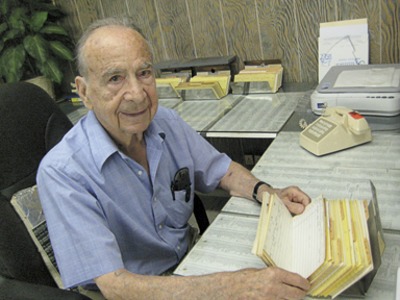Even though the fall election is still a few months off, the two mayoral hopefuls and their council candidates are spending the summer months walking the streets of Secaucus, asking for votes, sometimes armed with Board of Elections data on which residents are R’s (Republicans), D’s (Democrats), or U’s (Undeclared). But long before the days of BlackBerrys and computerized spreadsheets, there was Paul Amico’s “bunker.”
“I don’t remember how it came to be known as ‘the bunker,’ ” Amico, who served as mayor from 1964 to 1992, said last week. “It’s just the place where I organized and kept all the information I had collected during my years in office.”
But it still exists.
On its surface, “the bunker” is little more than a couple of rooms in Amico’s Fourth Street basement. Beneath the surface, however, these rooms house more than 25 years worth of Secaucus voter data collected during his many campaigns for office.
“A lot of the information I collected then, you can probably buy now from companies that pull together this kind of information,” he said. “But when I got started, about the only information you could get were the names and addresses of registered voters. And you could get the names and addresses of residents. But to win an election, and to be an effective councilman and mayor, I needed more detailed information on our residents.”
Over the years Amico, now 96, developed an elaborate system, using colored metal flags, that allowed him to keep track of his supporters, supporters of the opposition, who needed absentee ballots, who had moved, the number of eligible voters in a home, and which door he should use when campaigning at an address.
Three-desk formation
Three desks in the formation of the letter U allowed him to keep track of voters who lived in each of the town’s three wards, with each ward assigned to a different table.
“Paul Amico represents the last of what I’d call ‘kitchen table politics.’ ” – Michael Harper
________
“Over here,” Amico opened a mid-sized cupboard, “I kept copies of all the local newspapers so I could refer to stories that had been written. Each section and each shelf was for a different publication.”
Observers fascinated
“Paul Amico represents the last of what I’d call ‘kitchen table politics,’ ” said Michael Harper, Hudson County Board of Elections clerk who also worked as campaign manager for former Mayor Anthony Just. “He practiced a very old-school style of campaigning that you really don’t see anymore. These days, campaigning has become more professionalized. The campaigns will still have volunteers working for them, but their role is going to be very different than it was when Amico was running for office.”
The door-to-door canvassing that both the Dennis Elwell and Michael Gonnelli campaigns are doing this summer, he added, is the last remnant of “Amico-style campaigning, because here in Secaucus people still expect that.”
When personal computers became affordable and started popping up on office desks everywhere, Amico said he was eager to bring them into the Municipal Center, “but I never computerized my system here,” he said. “I knew I wouldn’t be in office forever and so to transfer all this information onto a computer probably wouldn’t be worth it.”
Because Amico ended his political life in 1992, the information he collected doesn’t go much beyond 1989 or 1990, and, aside from the PC that now sits where typewriters used to be, there is a sense of being suspended in time when visiting the space.
The former mayor is aware of the passage of time and of how changing times have affected campaigning in the 21st Century.
“Candidates now have more tools available to them,” he noted. “They have computers, they have the internet. But they also have some new challenges, things I didn’t encounter, or only had to deal with in a limited way. There are more renters now, there are more apartment buildings, there are people in the town who haven’t lived here for very long. So, these are things they’ll have to work around.”
E-mail E. Assata Wright at awright@hudsonreporter.com.
